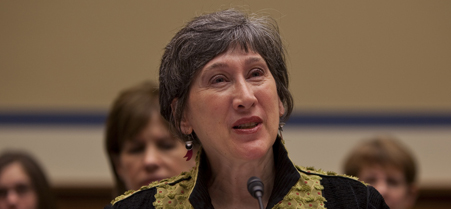On the road to digital FOIA processing, agencies take separate paths
At House hearing, departments discuss separate plans to improve electronic FOIA response.
 National Archives and Records Administration's Miriam Nisbet said more coordination on FOIA "is an idea worth considering."
National Archives and Records Administration's Miriam Nisbet said more coordination on FOIA "is an idea worth considering."
Multiple federal agencies are forging ahead with their own separate plans to incorporate technology to dig themselves out of a demanding backlog of Freedom of Information Act requests.
At a hearing Wednesday before the House Oversight Subcommittee on Technology, Information Policy, Intergovernmental Relations and Procurement Reform, representatives from various government branches outlined efforts to combat the Obama administration's FOIA struggles .
The hearing focused on how to move FOIA processing into the Digital Age in accordance with a 1996 congressional amendment allowing public government documents to exist in electronic as well as paper formats.
Melanie Ann Pustay, director of the Office of Information Policy at the Justice Department, discussed the office's recent implementation of FOIA.gov , a comprehensive website that aims to make FOIA data throughout the government publicly available from one location.
The site is not the government's only current effort to migrate FOIA processing online. In September 2011, the Environmental Protection Agency partnered with the Commerce Department and the National Archives and Records Administration to adapt the pre-existing Regulations.gov , a federal rule-making portal, to the world of FOIA processing.
Miriam Nisbet, director of the Office of Government Information Services at NARA, said in her opening testimony that "harmonizing" efforts with FOIA.gov "is an idea worth considering."
During questioning, Nisbet stressed the government's desire to use the Internet to streamline the FOIA filing process for the public "so they don't have to go to 350 different places to make a request."
The administration at least partially processed more than 473,000 FOIA requests in fiscal 2011, the highest number since 2005. The number of requests received increased by nearly 39,000during this period, however. Additionally, according to the testimony of Sean Moulton, director of federal information policy at the nonpartisan OMBWatch, half those requests were only partially fulfilled.
The requests are not spread evenly across agencies. The Homeland Security Department received 36 percent of all FOIA requests in fiscal 2011 and is having trouble keeping up with an increased backlog, Moulton said. No Homeland Security representatives testified at the hearing.
The subcommittee's vice chairman, Rep. Mike Kelly, R-Pa., stood in for chairman Rep. James Lankford, R-Okla., at the hearing. Kelly told Government Executive that while he hopes the government could effectively embrace technology in FOIA processing, he wasn't familiar enough with the specifics of each agency to adequately judge their processing methods.
"I don't work at Homeland Security, and I don't work at those other agencies," he said. "It's not fair for me to criticize what they're putting out without really having a better feel."
NEXT STORY: Defense Smartphone, Tablet Update





